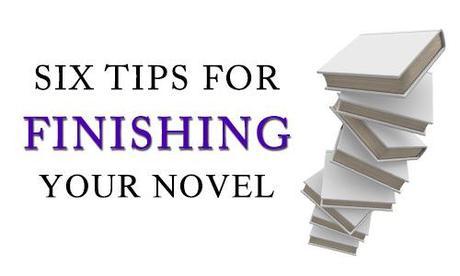We are delighted to welcome Rob D. Young, author of Broken Glass. Rob has stopped by to offer some useful advice on finishing a novel.
6 Tips for Finishing Your Novel

Writing a novel can feel like staring into your own open grave: You know, with certainty, that you’ll be swallowed up by it. Even after the hundreds of hours required to write, re-write, and polish the story, there can be no certainty that anyone will like the book. But it’s more than just your time at risk; a novel is an intimate expression of who we are as writers and as human beings.
How do you keep going in the face of this challenge? How do you stay motivated in the face of harsh reality? And how do you avoid that most common pitfall of all?: Abandoning one (or many) partially-finished books. Here are a few tips from my own experience.
1. Let it be about the story.
The story isn’t about you. It isn’t about proving to the world that you’re a great writer. It’s not about winning the admiration and affection of your peers. It’s sure as hell not about money. It’s natural to crave these things; that’s only human. But the reason to write a story is that story deserves to be heard.
If you remember that this isn’t about “winning,” but about your obligation to a story that you—and only you—can bring to life, it’s easier to separate your ego from the equation and focus on fighting the good fight of novel-writing.
2. Skip the boring stuff.
Many writers abandon a novel because they reach a part of the book that they weren’t excited for; they have a scene at the other side of a barren stretch of plot, but are crushed by the psychological drudgery of navigating that terrain. My advice? Don’t trudge though that terrain.
Skip ahead with a note to yourself to come back once everything else is done. You’ll write more happily and the distance will give the barren stretches of plot an opportunity to become more fertile. It’s also completely fine to just skip the boring section; if you’re not excited, your readers probably won’t be either. View the boring gaps between your better scenes as opportunities to practice time-killing devices.
3. Fall in love with your characters.
Neil Gaiman (the brilliant author of American Gods) says he fears the characters he hasn’t written might haunt him before he dies, confronting him about why he never brought them to life. Now that is a motive. But if you have a dislike—or, worse, a sense of banal indifference—for who your characters are, your story will quickly crumble. By developing rich characters that you connect with, your story will improve and you’ll feel motivated to continue.
If you need a boost in fleshing out your characters, here’s a fleshy character questionnaire I’ve developed. You can also explore by taking personality tests, filling out online dating profiles, or even taking Facebook quizzes on behalf of your characters.
4. Write consistently.
I finished my second novel during my sophomore year of high school. The opportunity was simple: I had a computer class and knew about as much as the teacher did. For 45 minutes each day, I was sitting in front of a computer with nothing to do. By the end of the semester, I’d written more than 50,000 words. The story of my third novel (which would become my first publication: Broken Glass) is similar: I had the opportunity to write backstage every night while performing at a local community theater. My fourth novel was written during the course of my Advanced Fiction Writing university course.
Chuck Palahniuk (author of Fight Club) discusses his own strategy: He signs up for time-share sales pitches or community college courses just so he can be “locked in a room” for a while. As the speaker drones on, he takes the opportunity to write. Whether you find an external space such as a time share meeting or simply work at developing a stable routine for writing, consistency is key for making it to the end of your work.
5. Keep starting.
You don’t ever finish a novel. Ever. You start page after page, segment after segment, edit after edit—and eventually you reach a point where you have to let it go. There isn’t such a thing as a novel being “complete.” Rather, you reach a point where you’re done. It’s time to move onto other projects; it’s time to let the story live on its own, without your support, and see what it can do.
You never “end” with your novel. But you reach the ending by starting, not once, but over and over again.
6. Have an audience.
Your first draft is going to be crap. That’s the nature of the thing. As such, many of us are uncomfortable allowing others to read that particular draft. However, I’ve been strongly motivated by a select group of close friends who read over segments of what I’ve written, keep track of the story as it evolves, and enthusiastically await the next chapter. When it’s just you and the story, it’s too easy to let it stay hidden in the shadows.
Whether you have a writing group, a group of close friends, or even an online creative writing community, shoving your unfinished story into the spotlight creates a useful sense of social expectation for your work.
Writing a novel is challenging and worthwhile. Almost everyone I know has started writing one; the real challenge is in bringing the full story to fruition. By following these six bits of advice, you can create a more productive and enjoyable writing environment that’s far more likely to lead to a completed novel.
About Broken Glass (2012)

Broken Glass dives into the mind and past of a murderer as he dissects the reasons for his actions. Filled with gothic tones, gritty struggles, and violence, the story’s undertones remain lighthearted—indulging in humor, romance, and philosophy as the narrator seeks to answer his question: What brought us here?
—–
I have to hold back my tears and my twisted malicious smile as I plant the gun deep into his chest. He’s screaming, but I’m so in my own world that I don’t understand. I know he’s swearing. Swearing more than you’d think possible in that three second window of time.
And then I pull the trigger. I feel this deep vibration, brace my muscles against the kick, but I’m still not sure if the gun went off. Thank God, I think. Maybe you didn’t kill him. I guess I didn’t expect there to be such a silencer effect. Like shooting into a pillow.
As his body thuds against the carpet, time comes to a full stop. My world has shrunk down to the size of this instant. I need to figure out what’s happened. What brought us here. And why—why, my finger shaking against the trigger—I feel that this was the only way I could possibly save him.
Amazon USAmazon UKGoodreads
About Rob D. Young


